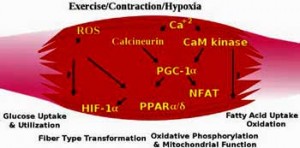



Twenty Times

Twenty times too much acid in the muscles sounds like something that could make walking seem like mountain climbing
Speaking matter-of-factly and calmly in the impeccably enunciated English (we only find in the English), Dr. Newton started off the muscle metabolism video stating:
“When we’ve asked people with ME to exercise while we’re measuring the accumulation of acid in their muscles, what we see suggests that patients with ME have about twenty times more acid in their muscles than we would expect.”
Twenty times — not two times, or four times, but twenty times more acid than expected. That’s jaw-droppingly high. That’s headline type data. Hopefully the news will get around – and her findings will be validated.
We Are Not Alone
Dr. Newton then said something I found quite encouraging: these findings are similar to those found in other disorders associated with severe fatigue. Any ME/CFS research that links up with other disorders is good news, because, honestly, we need all the help we can get. With researchers like Dr. Newton mostly relying on private foundation funding, we need researchers in other disorders to do as much of our work as possible.
Cause
What’s causing these extreme muscle acid accumulations? Dr. Newton chose her words carefully. She noted that the degree of acid accumulation found is ‘associated’ with the degree of autonomic nervous system dysfunction; i.e., the more dysfunctional the autonomic nervous system was, the more acid ME/CFS patients muscles were accumulating.

Dr. Newton’s research suggests the autonomic nervous system plays a important role in the exertion problems in ME/CFS and other severely fatiguing disorders
This suggests that in some way the ANS is modulating or regulating the accumulation of acid. It may be doing that by affecting the transporters that remove the acids from the cells, or it may be affecting the blood flow that should wash the acids away. (The ANS controls the blood flows in our body.)
Dr. Newton’s lab has also found deficiencies in the proteins or kinases found in the metabolic pathway associated with these acids. Dr. Newton didn’t say whether the breakdown is causing too many acids to be produced or whether it’s simply slowing the metabolism of these acids, but she appears to getting, in a way few researchers have, closer and closer to the cause of PEM.
Subsets Emerge
What do we do for now with these acid accumulations? What about exercise? It’s good for the heart, reduces pain, improves sleep … in just about everyone except for people with Chronic Fatigue Syndrome. Does it ever help people with “ME/CFS”?
Both Dr. Newton’s MRI studies and her muscle cell experiments indicate at least two types of muscle cell abnormalities – what researchers call ‘phenotypes’ (“fee – no – types,” she repeated, pausing slightly after each syllable in her perfect English) are present in ME/CFS.
Dr. Newton on Muscle Metabolism in ME/CFS
One of these ‘phe-no-types’ looks like it may very well improve with exercise, but the other one will not. That’s a fascinating finding given the huge dichotomy between studies suggesting that graded exercise therapy can be helpful and the surveys indicating it’s often very harmful. Is a small exercise-responsive subset present in ME/CFS? Dr. Newton’s research suggests there may be.
Reversible?
Newton is using nanosensors that can cross the wall of the muscle cells to determine the pH of the muscle cells as they ‘exercise’. These nanosensors ‘light up’ when a certain pH is reached. Importantly, they’re confirming what the MRI studies suggested – that the muscle cells of people with ME/CFS quickly accumulate enormous amounts of acid.
By adding different substances to the muscle cell mixture Dr. Newton been able to determine that the acidosis is reversible in the lab. That suggests that drugs could moderate or even possibly eliminate this problem.
(The acidosis is not just effecting the muscles. One of Dr. Newton’s recent studies indicated that the high acid levels in the muscles were associated with poor blood flows to the brain. That suggests that reducing muscle acid levels might be able to help with orthostatic intolerance and cognitive issues.)
Autonomic Nervous System Issues
Getting back to the autonomic nervous system, Dr. Newton noted that 90% of ME/CFS patients have symptoms associated with autonomic nervous system (ANS) dysfunction. Why ANS dysfunction is so prominent in ME/CFS is uncertain, but clear suspects have emerged.
The brain centers that control the ANS in the brainstem could be damaged, or problems in the hypothalamus and HPA axis could play a role, or the ANS could be having trouble regulating the cardiovascular system.
- See The Big Picture Emerging for Dr. Bateman’s presentation describing how brain problems could be affecting the ANS, the HPA axis and other systems.)
Conclusion
Large acid accumulations, varied muscle phenotypes, reversing acid accumulations, and ANS problems … Dr. Newton packed a lot into this seven-minute video. Her research is rich with promise for ME/CFS and other fatiguing disorders.
Validation of Dr. Newton’s work will, of course, be critically important and the CDC may help out in this regard. Their lactate accumulation testing in their multisite exercise study could help validate, if I have my facts right, the acid accumulations Dr. Newton has found. The CDC’s gene expression analyses could also shed light on this area (and hopefully validate the Light’s gene expression findings.)
Kudos to Dr. Newton and the UK nonprofits supporting her work and for ME/cvs Vereniging for providing this intriguing video.
__________________________________
Dr. Newton is Clinical Professor of Ageing and Medicine and Dean of clinical medicine at the School of Clinical Medical Sciences of Newcastle University inNewcastle upon Tyne, England. She is Director of MD Studies in the Faculty of Medical Sciences at Newcastle, and a member of the Pharmacogenomics & Complex Disease Genetics Research Group.
Dr. Newton’s studies on the origin of fatigue, autonomic dysfunction, orthostatic intolerance, etc. in disease include Chronic Fatigue Syndrome (ME/CFS), primary biliary cirrhosis, Sjogren’s Syndrome and other disorders. Find a list of her studies here.









What about autonomic dysfunction resulting from infections of the ANS ganglia? This would be consistent with improvement of all symptoms with antiviral Tx. Excess acid due to poor blood flow due to ANS malfunction, due to infection of ANS ganglia.
Agreed – time will tell – I like that different research groups are pointing to the same system. Congruence is good in research 🙂
Ive suspected HSV1 has gotten in my autonomic ganglia but no one would pay attention.
Pridgen’s found HSV-1 – blog coming up on that.
Hi Cort,
Hope you’re AWAP.!
Could you please share the full name of Dr. Newton and her credentials, where she works and if she has published research on this? I’m seeing Dr. Jaradeh at Stanford Medical who is a neurologist specializing in ANS problems like POTS. He sees a lot of ME/CFS patients.
By the way, he said many doctors object to the use of the term ME because they say many CFS patients do not have pain associated with their illnesses? I hadn’t heard this before.
Thank you David for your comment!
I want to bring information to Dr. Jaradeh if possible. Thanks for all you do! All the best, Esther
I hope I’m AWAP as well (I think :))
I listed her postion at the bottom of the blog and added a link to her studies. She has published many studies not just on ME/CFS but on similar problems in primary biliary cirrhosis and some on Sjogren’s Syndrome.
That link didn’t work – this one should – http://www.ncl.ac.uk/biomedicine/contact/team/profile/julia.newton#tab_publications
Hi
great interest here – again!
I used the link you provided to review other studies but it shown ‘no history found’. This may be why Esther requested the information again ?
Can you check again, see if it works for you ?
Yes, bad link – this one should work. http://www.ncl.ac.uk/biomedicine/contact/team/profile/julia.newton#tab_publicatio
Thanks for letting me know.
I must be missing something, but I am wondering why the focus is only on acidosis in the muscles, and not in the brain itself.
I think Shungu found high lactate lelvels in the brain – which I had completely forgotten about ….
Yes, he did! Isn’t that something – the same process perhaps occurring in the brain and the muscles! Shungu suggested some of the same reasons as well – reduced blood flows and mitochondrial problems
Exciting stuff…thanks for the question 🙂
NMR Biomed. 2012 Sep;25(9):1073-87. doi: 10.1002/nbm.2772. Epub 2012 Jan 27.
Increased ventricular lactate in chronic fatigue syndrome. III. Relationships to cortical glutathione and clinical symptoms implicate oxidative stress in disorder pathophysiology.
Shungu DC1, Weiduschat N, Murrough JW, Mao X, Pillemer S, Dyke JP, Medow MS, Natelson BH, Stewart JM, Mathew SJ.
Chronic fatigue syndrome (CFS) is a complex illness, which is often misdiagnosed as a psychiatric illness. In two previous reports, using (1)H MRSI, we found significantly higher levels of ventricular cerebrospinal fluid (CSF) lactate in patients with CFS relative to those with generalized anxiety disorder and healthy volunteers (HV), but not relative to those with major depressive disorder (MDD).
In this third independent cross-sectional neuroimaging study, we investigated a pathophysiological model which postulated that elevations of CSF lactate in patients with CFS might be caused by increased oxidative stress, cerebral hypoperfusion and/or secondary mitochondrial dysfunction.
In exploratory correlation analyses, we found that levels of ventricular lactate and cortical GSH were inversely correlated, and significantly associated with several key indices of physical health and disability. Collectively, the results of this third independent study support a pathophysiological model of CFS in which increased oxidative stress may play a key role in CFS etiopathophysiology.
Soooo how can we go about bringing down our acid levels??? hmmm And this all resonates 100% with what I think is goin on with me. I get temporary declines in symptoms when I take any brain stimulating drugs/herbs and have always wondered why… In my opinion all of our symptoms point to a damaged or infected brain… Now just what to do before I am too old to care…anymore. 🙁
I wonder if those brain stimulating drugs are increasing blood flows or ? It turns out- see Christians comment above – that a similar acidosis may be occurring in the brain – if I understand this right.
I have ANS dysfunction. Because if it I ended up with a pacemaker. Are MRIs the only way to detect high muscle acid ? Having the pacemaker I can’t have MRIs. This has proven difficult with other diagnoses. This disease has caused havoc in my body. I don’t have a Neurologist anymore. Once I was diagnosed he discharged me as a patient. He said there was nothing more he could help me with. Having been discharged no other Neurologist will take me on as a patient. I find as the years progress , so does my disease . I’ve been reading it is not good for you to take low blood pressure medication with an anti inflammatory . I can’t live without either one. I try to find out as much as I can about this disease, but I can’t seem to find very much information. Do you have any recommendations?
Thank you for your time:)
I think blood tests can also detect lactate – I think that’s what the CDC is doing.
I’m afraid I don’t have idea on the anti-inflammatory/blood pressure question.
I’m sorry I forgot to mark I would like to be notified by email as well
Professor Julia Newton lists her research publications here http://www.ncl.ac.uk/biomedicine/research/groups/profile/julia.newton#tab_publications
True story. When i done my VO2Max test ( last year, at the 4, 5 th of disease), i toke just 3 min before 200 mg CoQ10 high quality. Results of my Vo2max was abnormals, and my levels of acid lactic was 4 times more than normal. My friend, who is ME sufferer too, done too v02max test. His levels of acid lactic was 15 times more than normal. Sorry for my English, im French.
Amazing stuff. Thanks for sharing.
I have ME and POTS and all ‘classic’ symtoms but i do not have so much pain only at night i get in my muscles some accid burning sensation. Overall pain is not my main symptom. More cardio vaculair problems.
Hi, Great article! It looks like the muscles cant use/transport the fuel – i.e., lactic acid is now considered to be a fuel. Here is a interesting article:
http://www.nytimes.com/2006/05/16/health/nutrition/16run.html?_r=0
Thank you Cort! Would you happen to know if Dr Julia Newton ever visits the USA to lecture or for any other reason?
What is the best way to follow her progress? Thank you once again. The other videos that she has posted are also quite interesting.
Hi Andrew. I think this Facebook site – https://www.facebook.com/pages/ME-CFS-Research-Newcastle/526359017390431 – is from her group.
I’m very interested in her work so I try to keep up with it – so this blog is a good place. I’m going to do overviews of some of the other videos as well.
Hi,
Great article! It looks like lactic acid is now considered a fuel source and not a waste by-product of muscles. That being so, a build up would seem to imply that the fuel was not able to be used or transported effectively. Here is an interesting article I found: http://www.nytimes.com/2006/05/16/health/nutrition/16run.html?_r=0
http://www.nytimes.com/2006/05/16/health/nutrition/16run.html?_r=0
This is a good point, I wonder why Dr Newton did not discuss the obvious point that high lactic acid levels indicate low mitochondria function in the muscles? Her research would seem to support a problem with mitochondria.
Julia Newton at Newcastle university is running the largest biomedical research centre into ME/CFS in Europe as I understand it, also working with Northumbria University on Translational Studies and Dr Jason Ellis in Northumbria.
I don’t think it is the subset of ME that one has which allows exercise. I have been in every subset and every level of disability including barely able to get out of bed. I believe I have had ME since birth secondary to the effects of DES.
I can do some exercise now and it is a combination of pacing, diet and slowly increasing over a period of years that did it. If I had not been doing better due to Dr. Wahl’s Protocol I would not have been able to exercise. Since I had to cook everything from scratch I had to figure out how to use my limited energy to accomplish this. I chopped one or two vegetables at a time throughout the day and put them in a bowl so I did not have a POTS issue or huge fatigue. Slowly the increased nutrition helped.
Then I began doing exercises, some were from HANDLE a program of treatment for people with neurological issues, some were stretches and some were for strengthening. I can’ t do them like a normal person, only sets of 3 or 4 at a time throughout the day are possible(when I started I could only do 2-3 reps of most of them and some not at all), but it helped, a lot. My pain got better from diet, herbs, spices, stretching and the exercise.
I started walking, only a very small amount at first with slow increases. One very important thing to know, after any exercise, even a set of easy lying on the floor ones, always sit with you legs elevated for at least twenty minutes after each set. My routine is exercises, some work in the kitchen for a few minutes/housework, then sit for a while with legs up.
It has been four years and I can do other things, but have to be very flexible and conscious of energy, I think of it as budgeting my limited energy. Each day I do what I call the big push, one episode of walking, bike riding or something and then must sit a couple hours afterwards. I make sure my food is all prepped first.
My priority is my health, energy goes to that, then second is housework, etc. So, if I plan to do gardening for a period of time or ride my bike around my neighborhood I have to leave the exercises out (except for stretching). I have overdone it and gotten sick at times, but then rest and start back where I was.
One important thing I have learned is never let myself de-condition from where I am because it is too hard to get it back. Resting a couple days when I have overdone it now works better(recovery is shorter), I sleep better with the exercise and my brain works better. The best thing it does is lift my spirits.
The ME is still there it does not go away, but the symptoms are better and I now spend my money on organic veggies instead of lots of meds/supplements. I still take the core supplements for ME. For me right now the worst is I have PTSD on top of ME and the stress hormone factor causes huge problems. I still have to eat salt or fall down, still get migraines, still have urine concentration issues, still have a limited amount of time for brain concentration, still get dizzy and sometimes fall, still have chemical sensitivities and on and on, but I feel a bit better and can do a bit more as time goes on.
Every little bit of improvement is huge when you feel horrible. If I had not been at the stage I was in when I started to try to exercise the result would have been the opposite.
Thanks very much for that Celia. I know of several people who were very careful with pacing and ‘exercise’ and it really did pay off for them in improved quality of life and functionality over time. Like you they are not well but they definitely have better lives through doing those things.
Thank you so much Cort. I really enjoy your posts. I believe that Dr. Nancy Klimas has done some work on exercise with ME/CFS patients. I think she found that exercise does help her patients IF done with very strict guide lines.
Yes, limited exercise done properly helps people from becoming deconditioned.
Very interesting, Cort – I thought I was up to date with Prof Newton’s work, but clearly I’m not!
Incidentally, she doesn’t normally enunciate so clearly or speak so slowly – I’m assuming that that was because she was being filmed for a Dutch project (this video is one of a series of interviews with experts by a Dutch ME group).
I love the way she spoke in that video 🙂
I was not caught up either..Thanks to the Dutch group for doing the video.
This research is a useful step forward in piecing together the puzzle that is ME/cfs, but it is only one piece – acid accumulation in muscles is much more likely to be a secondary / tertiary symptom than a primary one.
Prof Newton’s finding doesn’t (for example) explain the immune system abnormalities and deficiencies which afflict ME/cfs sufferers and the gut dysbiosis (with consequent food intolerances) which they experience.
Don’t get me wrong. I’m pleased that this research finding has been made, but lets not get carried away with thinking that acid accumulation in muscles is the key to the problem.
O yes, Sympathetic nervous system hyperactivity tends to inhibit the Th1 (antiviral) branch and upregulate the Th2 (allergy, bacterial defense) branch of the immune system
I agree there’s more but I can, like Gijs see tie-ins all over the place. The ANS also regulates gut motility…..
I think ultimately we’ll be able to join the NK cell and other immune findings together. I suppose Van Elzakker’s hypothesis does it the best; it combines herpes virus infections, the ANS (vagal nerve) and the immune system together…
Cort, have you heard anything from Van Elzakker lately? I thought he was putting together a team to study his vagus nerve infection theory.
I just emailed him. All his time has been used up with PTSD (his paying gig) – he hasn’t had time to do much with ME/CFS (his volunteer gig) this summer.
Hi Cort, This is really interesting. I have FM,CFS and myofascial pain syndrome, I’ve always felt I’ve got too much toxins in my muscles. I feel Dr Newton’s research ties in well with Dr Andrew Holman who has found a subset of those with FM who’s symptoms are perpetuated by irritation of the cervical spinal cord which Dr Holman believes is increasing sympathetic tone in the ANS. See http://www.positionalcordcompression.com/images/70295i_PRABrochureR1_FINAL.pdf
Dr Newton’s different muscle groups could also explain why some people in our support group with ME respond well to the microcurrent device the Alpha-Stim and others don’t?
I am a Gufwar vet with ME and Fibro..I was an
athlete all my life before diagnois. On good days, I still
Exercise watching my pulse rate and Pace.
This article is amazing as my biggest problem
Has always been sorness after activity. I have been getting
Massage treatments to help squeeze out the lactic acid my bofdy
seems to have a hard time doing. Also, just starting Amino
acid powder. After my treatments, I am good to go starting
the next day. Of course consuming lots of water to
assist the removel of this nasty dormant acid thst lingers
Thank you so much forall your time.
Cory
Thanks everyone for all the comments and information.
My daughter suffered a severe viral infection at 13 years of age, was not truly recovered and attended school out of boredom after three weeks of being in bed for up to 18 hours per day. Fatefully she received a vaccination at school .. 5 plus years later she is STILL suffering the effects. Constant fatigue. Brain fog.
Graded exercise was one recommendation. Sadly she was reacting to exercise by having a decreased pulse, decreased temperature and lower blood pressure we opted to try a whole body vibration machine to help her system get movement without muscle ‘stress’. Whilst it has not healed her, it does keep her better conditioned than she would be without it. Dietarily she keeps very low on sugar, minimal grains, no gluten. Fresh as much as possible, organic as much as we can afford.
We are grateful so many people are now researching CFS/ME.
I hope sometime soon all these efforts will result in some remission and happier times for all the suffers.
I just hope a drug treatment is developed in my lifetime. I’m 19 yrs old and I have been sick for years and was bed bound for two years. I am not even asking for a cure, I just want to be able to live a normal life like working and driving. I don’t trust myself to drive right now and am living on social assistance because I cannot work. I can barely even move. Why are people punished with poverty because they have a disability and never worked? Why don’t we deserve enough to live off of?
Why do even a lot of doctors not believe in CFS? How do you feel about the term ME? Personally I think its useless because no one is sure what causes CFS. CFS is a trivializing name I would never deny this, it should definitely be renamed to something Latin and use a stronger word than fatigue. I think it makes us look scattered and unprofessional when we use the slash ME/CFS because you aren’t supposed to do that according to the WHO apparently.
I am scared because some research is saying we have brain damage yet there is nothing anyone can do. I am scared I will never be able to use my talents, to study humanities in university. I would be the first university student in my working class family. Are there any supplements that have good evidence for helping people with CFS? I am wary of supplements due to lax regulation but my doctor recommended me D-ribose and CoQ10. Are these a waste of money?
Is it possible for CFS sufferers to tolerate strength exercises? Cardio makes me feel so sick and its sad because I used to love cardio before I got sick. I would walk for hours a day while listening to music. It was so refreshing and a great way to deal with mental health issues and I miss it. Don’t mistake this post as me asking for medical advice I am just wondering what the science is.
I hope there is hope. I hope I will have a life before I die. I might as well be the walking dead.
Hang in there Courtney and keep tuned to this blog. Be careful with cardio -try and stay as fit as possible for now without wiping yourself out. I have heard that short term – very short term – strength exercises can be helpful. It appears that aerobic exercise capacity takes a huge hit in ME/CFS – so you have do quick exercises – in the recumbent position is best – then rest – then do a short strength exercise and rest….
Check out the Exercise Resource section on Health Rising – in particular a case where a woman by doing short term strengthening exercises did very well.
D-ribose and COQ10 are quite helpful for some people – definitely give them a try. They don’t help everybody but they do help some.
Good luck!
Interesting about the muscle acid levels being so high. It feels like my muscles never fully relax, people giving me massages note this. When I go to do anything which has a large power drain, I am exhausted in seconds, as though the muscle glycogen is consumed but no back up glycogen or glucose arrives, so first a full stop for a few minutes then into anaerobic mode.
It feels to me more like supply [from the liver?] is not happening at all, and I run full time on anaerobic mode. This must mean something. Though I studied Physiology in my twenties during which I crossed the line into what we call ME/CFS, I cant remember much, or marshall enough information at once to understand much of the current research. Thanks to all those who are doing stuff in this area to unravel the mysteries.
PS in 1993, for a whole year I had injections of 2 ml 50% MgSO4 approx. weekly. I had read in a ME publication that it helped some people with ME. 36 hours after the first injection my muscles worked normally. I jumped out of bed at 7.30 am and took the dog for about 2 km walk. Compared to years of dragging my arse about and getting my head and body together by about 5 pm to read a picture book or watch the sunset.
Truly the difference was remarkable, and going too long without an injection caused me to have withdrawals and muscle spasms, truly scary. Fixed within seconds of next injection. Aha I thought. Then I moved house, and knowing I might have trouble getting to a helpful doctor, I started taking Mg Orotate supplements. I never had any more withdrawals, nor any improvement ever again from MgSO4 injections and over a few weeks my internal battery flattened back to its pre-magnesium state. Dragging my arse again.
That was twenty years ago. I want some answers to why this might have happened. Its weird and I couldn’t possibly have made this up or imagined it. At times it is the only thing that keeps me sane, knowing that this is a physical condition I have, nothing psychological about it.
Now don’t everyone get too excited, as the initial article said that about 13% of people using the injections found some sort of benefit. But its cheap and might be an easy thing to rule in or out, early on.
I would love to hear if anyone has had a similar experience with Mg injections. Its a clue, just don’t know what to make of it.
My own research started with the assumption of “lactic acid poisoning” considering that I was drinking approx 4 gal of milk a week and excersizing heavily on a daily basis for my job. However, reduction of milk intake didn’t reduce the flaming muscle pain I’d get after a few short minutes of exertion. Eventually other symptoms crept in and I realized it was a larger systemic problem than I first thought. My “lactic acid poisoning” was a symptom of something more insidious.
information you may find useful: http://www.healingcfsme.com/recovery-from-cfs-cfids-me.html
Six years later and after a terribly debilitating bout with CFS, with very little medical support except from what I could find online, I deduced that enzymes were the key factor. Using a self-derived therapy, I have been entirely symptom free since June of 2014.
Use this information as you will… ;-}D>
The greatest dilemma is where to take the information I gathered over years, much of it overlapping with this. How do we sort this out when we have loads of information we can’t make sense of? Like others I’ve tried a litany of an array of doctors. Sadly I know you can’t even answer this.